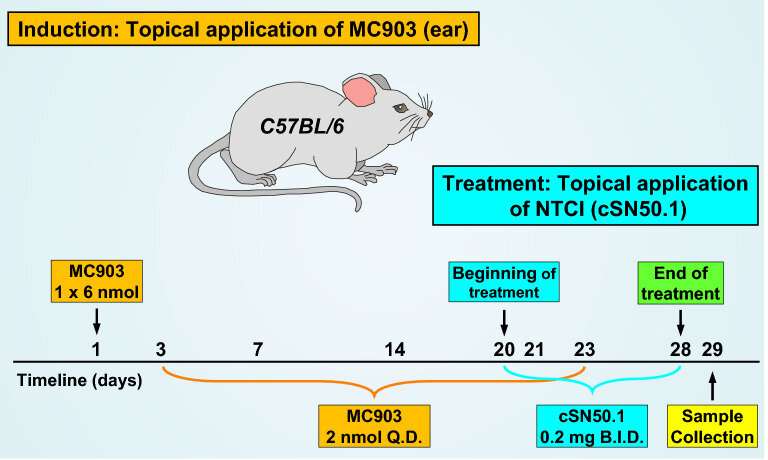This article has been reviewed according to Science X's editorial process and policies. Editors have highlighted the following attributes while ensuring the content's credibility:
fact-checked
peer-reviewed publication
trusted source
proofread
Scientists test new way to treat eczema

Researchers at Vanderbilt University Medical Center have developed a new investigational drug that can block inflammatory signaling in a preclinical model of atopic dermatitis—eczema.
Eczema, the most common recurrent inflammatory skin disorder, afflicts an estimated 10 to 20% of children and 5% of adults worldwide, with the highest incidence among African Americans. Symptoms and signs include intense itching, and skin rash with oozing and crusting lesions that can become infected, and which can disrupt sleep and daily activities.
Treatment for severe cases of eczema includes immunosuppressive drugs to control inflammation, monoclonal antibodies that counteract inflammatory proteins called cytokines or their receptors, and antibiotics to fight infection. These treatments will not cure or fully control eczema, however, and some of the drugs can cause significant side effects.
In comparison, the peptide drug developed by the VUMC researchers silenced cytokine-expressing genes, suppressed skin infiltration by inflammatory cells, and healed skin lesions, all without apparent toxicity, at least in the animal model.
"We unraveled the mechanism of eczema by demonstrating that we can control at least 15 genes responsible for the production of the major mediators of skin inflammation," said the lead investigator, Jacek Hawiger, MD, Ph.D., Distinguished Professor of Medicine and Louise B. McGavock Professor at VUMC.
Hawiger and his colleagues reported their findings Nov. 7 in the journal Scientific Reports. The topical drug, which is applied directly to inflamed skin, is now being tested in a multicenter clinical trial in patients with eczema.
More information: Yan Liu et al, Genomic control of inflammation in experimental atopic dermatitis, Scientific Reports (2022). DOI: 10.1038/s41598-022-23042-x




















